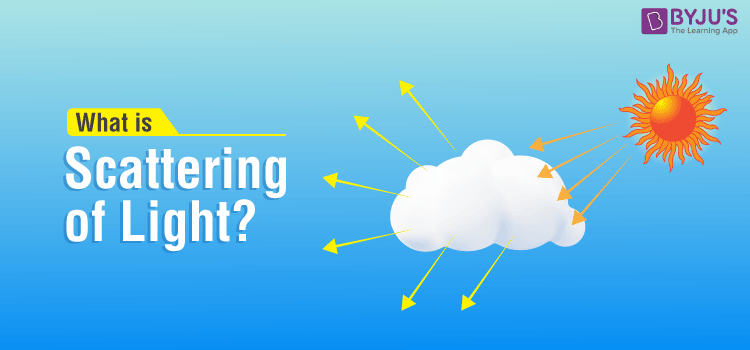
| Table of Contents |
Scattering of light
Light can be examined entirely from its source. When light passes from one medium to another, say air, a glass of water, then a part of the light is absorbed by particles of the medium, preceded by its subsequent radiation in a particular direction. This phenomenon is termed a scattering of light. The intensity of scattered light depends on the size of the particles and the wavelength of the light.
Shorter wavelength and high-frequency scatter more due to the waviness of the line and its intersection with a particle. The wavier the line, the more the chance it intersects with a particle. On the other hand, longer wavelengths have low frequency, they are straighter, and the chances of colliding with the particle are less, so the chances are less.
The bending of multicoloured light can be seen in the afternoon due to the refraction and total internal reflection of light. The wavelength of the sunlight forms different colours in different directions. Rayleigh scattering theory is reasoned for the red colour of the sun in the morning and the blue colour of the sky.
Let p be considered as the probability of scattering and λ is the wavelength of radiation, then it is given as:
The probability for scattering will give a high rise for a shorter wavelength, and it is inversely proportional to the fourth power of the radiation wavelength.
Why Is the Colour of the Clear Sky Blue? And Why Are the Clouds White?
Molecules with a larger size than the wavelength of light experience the scattering effect differently; the phenomenon is known as the Mie effect. Due to the largeness of particles, the light appears white. That is why the clouds, which are made of water droplets, are white. The blue colour is present in the major percentage of the lower wavelengths. With the wavelength of the light, the scattering efficiency of the small molecules in the atmosphere decreases. Sun radiates its light, and its rays fall into the earth’s envelope thus, sunlight gets scattered in the atmosphere.
Some examples also show scattering; particles like dust and smoke can also scatter radiation. In the same manner, we can explain the red colour appearance of the sun. For red light, the wavelength is more, and it is easy to go through the atmosphere as the scattering is less for red light. When the light is on any other object, it gets scattered depending on its properties as different light has different intensities, and each particle has different characteristics.
Frequently Asked Questions – FAQs
What is light?
Explain the concept of scattering of light.
What is meant by total internal reflection?
Why is the colour of the sky blue?
What was the most famous discovery of C V Raman?
Watch the video and solve the previous year questions in the chapter The Human Eye and Colorful World Class 10

Come fall in love with learning, only at BYJU’S.

Why is there a difference in the colour of the sun during sunrise and at sunset?
The rays travel a larger part of the atmosphere during sunrise and sunset as they are closer to the horizon during this period. As a result, light other than red is scattered away. Due to this reason, the red light which is the least scattered enters our eyes. This is the reason for the difference in the colour of the sun during sunrise and at sunset
because there is a difference in size of particles of medium between sunrise and sunset which causes us to see to sun as different colors